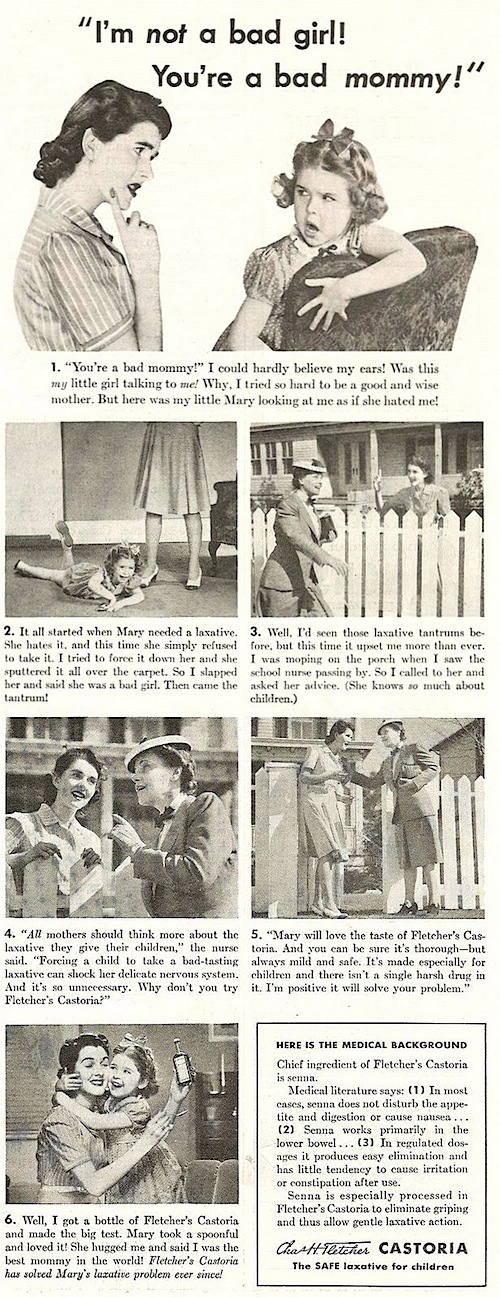August 7th, 2010 by Bryan Vartabedian, M.D. in Better Health Network, Health Tips, Humor
No Comments »

This “Fletchers Castoria” ad from 1941 is priceless. And as someone who spends his days working with bound-up grumps like Mary, I was reassured to know that horrific constipation is not a me-generation problem born of chicken fingers and Goldfish. ”Laxative tantrums,” however, are new to me. I seem to have pretty good luck with Miralax and Kristalose in my office. Your mileage (or tantrums) may vary.

*This blog post was originally published at 33 Charts*
August 4th, 2010 by Bryan Vartabedian, M.D. in Better Health Network, Health Policy, News, Opinion
No Comments »

Recently I ran into the office manager for one of Houston’s largest pediatric practices. New patient visits are way down and their doctors are looking for ways to keep business rolling. The same day I picked up this piece in the Wall Street Journal which shows declining admissions and doctor visits as a national trend. This is bad news and shows how our faltering economy is finally working its way more visibly into healthcare.
And apparently we’re making fewer babies –- admissions to neonatal intensive care units are down. This is a problem. For large tertiary medical centers and hospitals specializing in maternal-child health, babies are the critical customers of a healthy operation.
A few thoughts on what to look for (or dare I say, what to “expect”) with fewer babies:
Pipelines. Look for tighter referral relationships between large tertiary centers and the smaller community hospitals that deliver babies in need of specialized care. Centers already aligned with ready-made networks should be well-positioned for the downturn. Read more »
*This blog post was originally published at 33 Charts*
August 1st, 2010 by DrRob in Better Health Network, Health Tips, Opinion, True Stories
No Comments »

I’ve been practicing for sixteen years now, doing both internal medicine and pediatrics. One of the joys of that is watching kids under my care grow up and not having to give up their care just because they get older. The spectrum is wide, with some kids growing up in “normal” families with “normal lives,” others in “abnormal” families, and yet others with inherently “abnormal” lives due to illness or disability.
But the kids aren’t the only thing that has changed over the past sixteen years. Their doctor has changed as well. My comfort zones have widened, not getting rattled by “abnormal” as I once did. I used to feel uncomfortable with the mentally and emotionally disabled, now I am not. I used to feel sorry for parents with “abnormal” children. I used to feel bad for kids who were “abnormal.” I still do now, but not nearly as much. Read more »
*This blog post was originally published at Musings of a Distractible Mind*
July 30th, 2010 by RyanDuBosar in Better Health Network, Health Policy, News, Research
No Comments »

Study painting, drama or the “soft” social sciences and you’ll probably be a pretty good doctor anyway. Mt. Sinai School of Medicine has been doing it for years and compared students in a special liberal arts admissions program to its traditional pre-med students.
For years, Mt. Sinai has admitted students from Amherst, Brandeis, Princeton, Wesleyan, and Williams colleges based on a written application with personal essays, verbal and math SAT scores, high school and college transcripts, letters of recommendation, and personal interviews. No MCAT is required.
Students need to take one year of biology and one year of chemistry and maintain (swallow hard) a “B” average. They later get an abbreviated course in organic chemistry and medical physics. Read more »
*This blog post was originally published at ACP Internist*
July 29th, 2010 by Medgadget in Better Health Network, News, Research
No Comments »

 Identifying autistic kids as early as possible is very important so that appropriate clinical interventions and upbringing can have the most beneficial effect.
Identifying autistic kids as early as possible is very important so that appropriate clinical interventions and upbringing can have the most beneficial effect.
Now a new study in the Proceedings of the National Academy of Sciences has shown that analyzing the unique signature of children’s pre-speech vocalizations can be a pretty good way to identify potential cases of autism. Read more »
*This blog post was originally published at Medgadget*







 Identifying autistic kids as early as possible is very important so that appropriate clinical interventions and upbringing can have the most beneficial effect.
Identifying autistic kids as early as possible is very important so that appropriate clinical interventions and upbringing can have the most beneficial effect.







